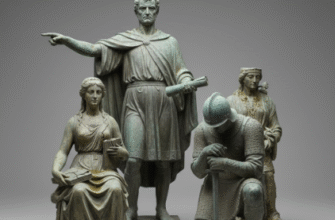Have you ever found yourself deliberately walking around a ladder, or felt a slight jolt of panic after breaking a mirror? Perhaps you’ve knocked on a wooden table to avoid jinxing a positive outcome. These small, often unconscious acts are remnants of a vast and ancient system of belief that operates just beneath the surface of our modern, rational world. Superstitions are the ghost stories of culture, passed down through generations, shaping our behaviors in ways we rarely stop to question. They are a universal human phenomenon, a fascinating tapestry woven from threads of fear, hope, and the eternal desire to control the uncontrollable.
Good Omens and Lucky Charms
The quest for good fortune is as old as humanity itself, and so are the symbols we associate with it. Across the globe, certain objects and actions are believed to be powerful magnets for luck, prosperity, and happiness. While some are universally recognized, others are deeply rooted in the unique soil of their native culture.
In the West, the four-leaf clover is perhaps the most iconic symbol of good luck. Legend has it that each leaf represents a virtue: the first is for faith, the second for hope, the third for love, and the rare fourth leaf brings luck. Similarly, the horseshoe is a powerful talisman, though its placement is a matter of some debate. Hung with the ends pointing up, it is said to collect luck, while hung with the ends pointing down, it showers luck upon those who walk beneath it.
Travel to Japan, and you will encounter the charming Maneki-neko, or “beckoning cat.” This ceramic feline, with one paw raised in a gesture of welcome, is a common sight in shops and restaurants, believed to attract customers and wealth. The color of the cat can also change its meaning; a white cat invites general good fortune, a black one wards off evil, and a gold one is thought to bring monetary success.
Rituals for a Better Fate
Beyond tangible objects, specific actions are also thought to tip the scales of fate in our favor. The act of crossing one’s fingers is a common gesture to hope for a good outcome. Its origins are murky, with theories suggesting it began as a pagan symbol of a cross to concentrate good spirits or as a secret sign used by early Christians to recognize one another. Another popular ritual is to “find a penny, pick it up, all day long you’ll have good luck.” This likely stems from a time when any form of found money was a significant blessing, a small gift from the gods.
In Spain, the arrival of the New Year is marked by a frantic and hopeful tradition: eating twelve grapes, one for each stroke of the clock at midnight on December 31st. Successfully consuming all twelve before the clock finishes chiming is said to guarantee a year of prosperity and good fortune. Each grape represents a month, making this a delicious high-stakes race against time.
Whispers of Warning: Bad Omens and Taboos
For every superstition designed to attract good luck, there seems to be another that warns of impending doom. These beliefs often serve as cautionary tales, encouraging careful behavior and respect for the unseen forces that govern the world.
Perhaps the most dreaded household accident is breaking a mirror. The belief that this act unleashes seven years of bad luck dates back to the Romans, who held that life renewed itself in seven-year cycles. A mirror was thought to hold a reflection of the soul, and breaking it would thus damage the soul, trapping it until the next cycle began. Similarly, walking under a ladder is a major taboo in many Western cultures. This superstition has a few possible origins, from the ladder forming a triangle against a wall—a shape considered sacred and not to be broken—to its simple association with gallows and executions.
The tradition of knocking on wood is one of the most widespread superstitions for warding off bad luck. Its origins are debated, but one popular theory traces it back to ancient pagan cultures who believed that spirits and gods resided in trees. Touching a tree was a way to ask for protection or to thank the spirits for good fortune. This simple act has endured for centuries, evolving into a common ritual performed on any wooden object to prevent a good situation from turning sour.
Unlucky Numbers and Unwise Actions
Numbers themselves can carry heavy superstitious weight. In the Western world, the number 13 is considered profoundly unlucky, a fear known as triskaidekaphobia. Hotels often skip the 13th floor, and many people avoid making important decisions on Friday the 13th. This fear is often linked to the Last Supper, where Judas Iscariot, the disciple who betrayed Jesus, was the 13th guest to sit at the table.
In many East Asian cultures, however, the truly fearsome number is 4. This is because the pronunciation of the word for “four” in languages like Mandarin, Cantonese, and Japanese is very similar to the word for “death.” This has led to a widespread phenomenon called tetraphobia, where buildings may lack a 4th, 14th, or 24th floor, and giving a gift in a set of four is considered a grave insult.
Other common warnings are woven into daily life. Spilling salt is seen as a bad omen, a belief that likely arose when salt was an expensive and vital commodity. The prescribed antidote—throwing a pinch of the spilled salt over your left shoulder—is meant to blind the devil, who is thought to be lurking there, waiting for an opportunity to cause mischief.
Superstitions in Everyday Life
Many superstitions are not about grand gestures of luck or doom but about the small, mundane activities of daily life. These unwritten rules govern everything from household chores to gift-giving etiquette.
- At Home: In Russia and several other Slavic countries, it’s considered bad luck to whistle indoors, as it is believed you will “whistle your money away.” In many parts of the world, including India and West Africa, one should never sweep the house after dark, as you risk sweeping away your good fortune along with the dirt.
- Gift-Giving: The etiquette of gift-giving is rife with superstitious landmines. In China, giving a clock as a gift is a major faux pas, as the phrase “to give a clock” sounds ominously like “to attend a funeral.” Giving a sharp object, like a knife or scissors, is thought to sever the relationship between the giver and the recipient in many cultures. To circumvent this, the recipient will often “pay” for the gift with a small coin, turning it into a transaction rather than a gift.
- The Evil Eye: In Greece, Turkey, and across the Middle East, the belief in the “evil eye,” or mati, is pervasive. It’s thought that a person can cast a curse on someone else, often unintentionally, simply through a glance of envy or excessive praise. To ward off this malevolent force, people wear blue eye-shaped amulets and may even perform a small, symbolic spitting motion (three times, “ftou, ftou, ftou”) when admiring something or someone, particularly a baby, to protect them from harm.
Whether we dismiss them as old wives’ tales or secretly cross our fingers when no one is looking, superstitions remain a vibrant part of our shared human experience. They are a colorful, sometimes confusing, but always fascinating window into the history, fears, and hopes of cultures around the world. They remind us that for all our logic and science, there is still a part of us that looks for magic in the everyday.








